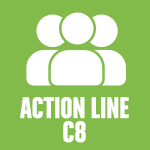E-Learning for Refugee Children and Youth
Geneva Tsinghua Initiative and University of Geneva

Session 170
ICTs for SDGs: Scaling Awareness and Education
This panel discussion will focus on bridging the gap of unequal access to education for refugee children and youth in refugee camps and displaced communities through ICTs. Different experts will share their thoughts on the current projects taking place in the field, and discuss the possibilities for further innovation and scalability, in order to define best practices for e-learning for refugees.
1) Moderator will introduce herself and the topic of discussion.
2) Panelist will give an individual presentation of their work and general standpoint on the proposed topic.
3) Panelists answer the questions asked by the moderator and discuss interactively with the other participants.
4) Q&A session at the end of the guided panel discussion.
Moderator
Nikita Feiz, Founder, Asylrättstudenterna (NGO), Sweden
Speakers/Panellists
Dexter Findley, Performance and Project Development Lead, Xavier Project
Paul O'Keeffe, Post-Doctoral Researcher, InZone
Hannah Bond, Instructional Design and Development at King’s Online, and Project Lead at PADILEIA Project
Govinda Upadhyay, Founder and CEO, LEDSafari
Virginie Morel, Executive Director and Founder, Innovative Trauma Relief Access
Session's link to WSIS Action Lines
-
 C2. Information and communication infrastructure
C2. Information and communication infrastructure
-
 C3. Access to information and knowledge
C3. Access to information and knowledge
-
 C4. Capacity building
C4. Capacity building
-
 C7. ICT Applications: E-learning
C7. ICT Applications: E-learning
-
 C8. Cultural diversity and identity, linguistic diversity and local content
C8. Cultural diversity and identity, linguistic diversity and local content
-
 C10. Ethical dimensions of the Information Society
C10. Ethical dimensions of the Information Society
-
 C11. International and regional cooperation
C11. International and regional cooperation
With emerging ICT innovations, possibilities of providing education by means of digital gears have been enlarged to address the limitations of traditional learning methods. In this respect, e-learning (C7) has enabled the fulfillment of portable, self-initiative, and tailored contents of education, through which different learners are able to have access to information and knowledge (C3) for individual capacity building (C4). E-learning for refugee children and youth has been recognized to engender immense potential as education can be personalized to each individual environment, and life situation (C8). With the goal of providing educational opportunities to refugee children and youth through ICTs (C2), we seek to facilitate local, national, international, and transnational cooperation (C11), while taking into account ethical dimensions and context-specific data (C10).
Session's link to Sustainable Development Process
-
 Goal 1: End poverty in all its forms everywhere
Goal 1: End poverty in all its forms everywhere
-
 Goal 4: Ensure inclusive and equitable quality education and promote lifelong learning opportunities for all
Goal 4: Ensure inclusive and equitable quality education and promote lifelong learning opportunities for all
-
 Goal 5: Achieve gender equality and empower all women and girls
Goal 5: Achieve gender equality and empower all women and girls
-
 Goal 8: Promote inclusive and sustainable economic growth, employment and decent work for all
Goal 8: Promote inclusive and sustainable economic growth, employment and decent work for all
-
 Goal 16: Promote just, peaceful and inclusive societies
Goal 16: Promote just, peaceful and inclusive societies
-
 Goal 17: Revitalize the global partnership for sustainable development
Goal 17: Revitalize the global partnership for sustainable development
With the commitment of leaving no one behind, this panel discussion aims to bridge the gap of access of quality education and lifelong learning opportunities (SDG 4) by catalyzing partnerships and dialogue between various stakeholders (SDG 17) working with digital learning technologies. Innovating and scaling up a variety of e-learning technologies for refugees will endorse more just and inclusive societies (SDG 16), provide employment opportunities (SDG 8), promote gender equality (SDG 5), and push towards eradicating poverty (SDG 1).